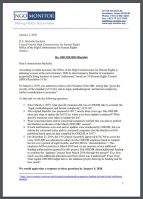NGO Monitor Letter to OHCHR High Commissioner Michelle Bachelet Regarding the BDS Blacklist
[Excerpts]
Dear Commissioner Bachelet,
According to media accounts, the Office of the High Commissioner for Human Rights is planning to issue at the end of January 2020 its discriminatory blacklist of companies purportedly doing business in Israeli “settlements” based on UN Human Rights Council (HRC) Resolution 31/36.
On March 4, 2019, you authored a letter to the President of the HRC noting that “given the novelty of the mandate [of 31/36], and its legal, methodological, and factual complexity, further consideration is necessary”.
To that end, we ask the following questions:
- Since March 4, 2019, what specific measures did you or OHCHR take to consider the “legal, methodological, and factual complexity” of 31/36?
- The original blacklist was prepared in 2017, nearly three years ago. Has OHCHR taken any steps to update the list? If so, when were these updates conducted? What specific measures were taken to update the list?
- Were concerned states and/or concerned companies notified that you plan to publish the blacklist in advance of the March 2020 HRC session?
- If such notifications were sent and no updates were conducted by OHCHR, did you inform the concerned states and/or concerned companies that the blacklist will be published based upon on data compiled by OHCHR in 2017?
- On December 23, 2016, the UN General Assembly approved $138,700 to cover the costs. $102,400 was allocated as salary for the OHCHR employee hired to compile the list over a period of eight months, and $36,300 for “documentation.”1 This employee left her position in March 2018 and we are unaware of any additional funding authorizations granted for this project. Did OHCHR obtain additional funding to continue the “database” project from March 2018-through the present? If so, how much was this additional allocation and from where was it authorized? If not, from what regular OHCHR budget item is the database project drawing its funding and for how much?
In addition to the important due process and transparency questions raised above, we again remind you of our significant ongoing concerns regarding OHCHR’s preparation of this “database”.
Although called a “database” ostensibly about companies “directly and indirectly, enabled, facilitated and profited from the construction and growth of the settlements,” this discriminatory blacklist is intended to defame and economically damage companies for doing business with Israel. The ultimate goal is to isolate, demonize, and harm the Jewish state, as part of the antisemitic BDS campaign.
There are a number of substantive flaws regarding the “database,” which we highlight below. These include the promotion of antisemitism, disregard for human rights, multiple legal fallacies, and disregard for international peace agreements.2
The mandate of Resolution 31/36 was fulfilled with the publication of OHCHR’s January 2018 report. There is no moral, legal, methodological, or factual basis for this project to continue and we urge you to order its conclusion immediately.
Footnotes
- https://www.cnsnews.com/news/article/patrick-goodenough/un-approves-funding-first-anti-israeli-settlementblacklist
- The OHCHR blacklist also violates the UN Charter, is based on a blatantly false interpretation of international humanitarian law, and subverts and damages the business and human rights framework, in particular the UNGPs and the concepts of due diligence and risk mitigation. See our January 2017 submission to OHCHR for more analysis on these issues available at: http://www.ngo-monitor.org/nm/wp-content/uploads/2017/01/Submissionto-HRC-on-Blacklist.pdf

